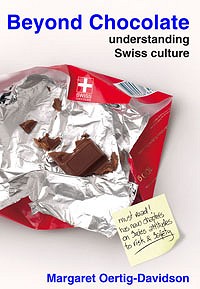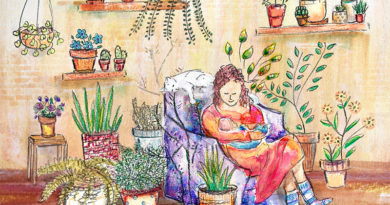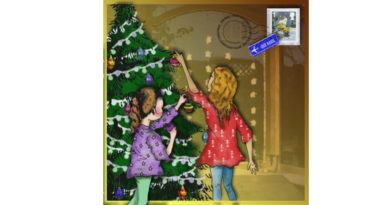Review of “Beyond Chocolate”
 Whether you have been in Switzerland for five days or five years or more, you will enjoy reading Margaret Oertig-Davidson’s Beyond Chocolate: Understanding Swiss Culture (Basel: Bergli Books, 2002.)
Whether you have been in Switzerland for five days or five years or more, you will enjoy reading Margaret Oertig-Davidson’s Beyond Chocolate: Understanding Swiss Culture (Basel: Bergli Books, 2002.)
The author is Scottish, married to a Swiss man, and has lived in Switzerland since 1987. She mainly addresses English-speaking expatriates from Western countries, although many readers, even Swiss ones, will find something enlightening in this book. Much of her information pertains to German-speaking Switzerland, but there are plenty of facts about the French and Italian parts, too. She discusses Swiss manners and behaviors, in society and business, and gives insight into the philosophies and mindsets behind them.
A cornerstone of Oertig-Davidson’s discussion is the idea of “peach cultures” versus “coconut cultures.” In this model, the outer layer of the fruit represents a person’s public space, and the inner layer, their private space. Like Germany and many other European and Asian countries, Switzerland is a coconut culture. Coconuts are difficult to crack; they make a clear distinction between colleagues, acquaintances, and neighbors in the outer layer (where only surnames are used), and friends and family in the inner layer (where first names are used). Swiss people generally do not give out personal information to acquaintances, but share more of themselves in the inner layer, where the commitment is life-long.
English-speaking countries have more of a peach culture. Peaches share themselves more readily with many people, treating new acquaintances as potential friends. They are softer and sweeter on the outside, tending to be on friendly terms with a wide range of people, but intimate for life with very few, such as family. The author’s discussion of coconut-versus-peach generalizations helps to clarify many of the sticky points of Swiss society for English-speaking foreigners. Below are a couple of particulars the author discusses; you may have already observed them for yourself.
The term Anstand refers to “correct behavior,” and is practically a requirement for the Swiss in daily life – a basic, unwritten code of behavior. When we first moved to Zurich, I thought of it as basically a way of acknowledging others’ existence. Saying “Prost” before drinking wine and “En guete” before a meal – these are not cute tricks; people do them as a rule. Once my mother and I bought food at the market at the Hauptbahnhof (main train station) in Zurich one day and sat down at a large table to eat it. The couple sitting across from us wished us a polite “En guete” as we began to eat. After that couple left, two more people sat down with their food. I tried, “En guete,” and was assured by their friendly acknowledgement that I was speaking the right social language. It was a satisfying moment.
Many of us with children moan about the attention our children receive from others (especially older people) in public. Unsolicited comments about our “underdressed” or unruly children can be surprising and feel like hostility. Oertig-Davidson explains that this social control can actually be a positive thing: “People care and society has a duty to integrate the younger generation. People will admire babies, chat to children and also tell them off if necessary.” Yes, there are some bossy grumblers out there, but sometimes people are just expressing their “civil courage”: the courage to stand up for one’s beliefs for the sake of the community. This is an important aspect of the Swiss way of thinking. Another important point for the Swiss is that children are expected to have more independence and self-reliance that many of us from English-speaking countries are comfortable with. This, also, is addressed in the book.
I have lived here almost six years, and have experienced many ups and downs of adjustment, and I expect to experience many more. I found that Beyond Chocolate clarified many things for me, and I really enjoyed reading it. Highly recommended for any expatriate!
By Carol McDonald
Carol wrote this review over nine years ago. She has lived in Switzerland for 15 years and has two children, ages 15 and 12.



